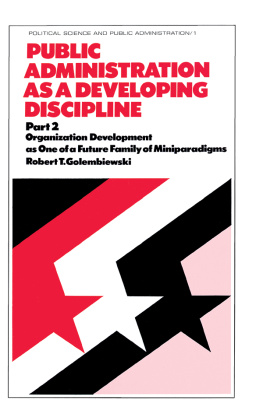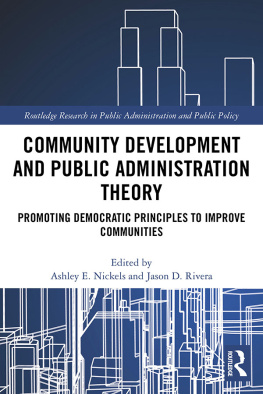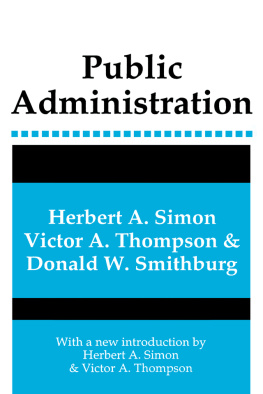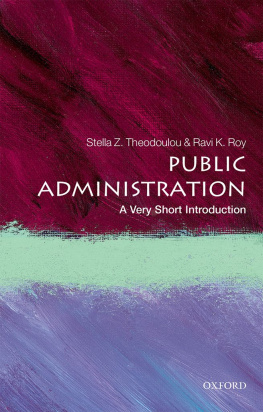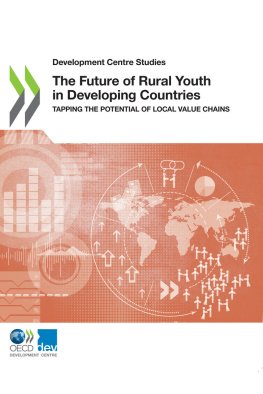PUBLIC ADMINISTRATION AS A DEVELOPING DISCIPLINE
POLITICAL SCIENCE AND PUBLIC ADMINISTRATION
A Program of Textbooks and Monographs
Executive Editors
KENNETH FRIEDMAN | NICHOLAS L. HENRY |
Department of Political Science | Center for Public Affairs |
Purdue University | Arizona State University |
West Lafayette, Indiana | Tempe, Arizona |
Public Administration as a Developing Discipline (in two parts)
by Robert T. Golembiewski
Comparative National Policies on Health Care
by Milton I. Roemer, M.D.
Exclusionary Injustice: The Problem of Illegally Obtained Evidence
by Steven R. Schlesinger
Further volumes in preparation
Public Administration as a Developing Discipline
Part 2: Organization Development as One of a Future Family of Miniparadigms
Robert T. Golembiewski
THE UNIVERSITY OF GEORGIA
ATHENS, GEORGIA
Published in 1996 by MARCEL DEKKER, INC.
by Routledge
711 Third Avenue, New York, NY 10017
and by Routledge
2 Park Square, Milton Park, Abingdon, Oxon OX14 4RN
Routledge is an imprint of the Taylor & Francis Group, an informa business
1996 by MARCEL DEKKER, INC. All rights reserved
The right of Gerald J. Miller to be identified as author of this work has been asserted by her in accordance with sections 77 and 78 of the Copyright, Designs and Patents Act 1988.
All rights reserved. No part of this book may be reprinted or reproduced or utilised in any form or by any electronic, mechanical, or other means, now known or hereafter invented, including photocopying and recording, or in any information storage or retrieval system, without permission in writing from the publishers.
Trademark notice: Product or corporate names may be trademarks or registered trademarks, and are used only for identification and explanation without intent to infringe.
British Library Cataloguing-in-Publication Data
A catalogue record for this book is available from the British Library
Library of Congress Cataloging-in-Publication Data
Golembiewski, Robert T
Public administration as a developing discipline.
(Political science and public administration ; v. 1)
Includes bibliographical references and indexes.
CONTENTS: Ft. 1. Perspectives on past and present.Ft. 2. Organization development as one of a future family of miniparadigms.
1. Public administration. 2. Organizational change. I. Title. II. Series.
JF135l.G625 350 76-50383
ISBN: 978-0-824-76566-8 (hbk)
ISBN: 978-1-315-08933-1 (ebk)
Typeset in Times New Roman
by codeMantra
To Hope
whose presence inspires
whose achievements reflect
a quiet but determined
and effective discipline
whose patient persistence
sees todays efforts as
the clear prelude to
tomorrows attainments
Contents
What has been in public administration and what may come to bethese are the essential burdens of a pair of complementary volumes devoted to the theme Public Administration as a Developing Discipline. The two volumes are subtitled:
The first focus, clearly, is on how public administration got where it is. The second focus is on one approach toward further disciplinary development.
This pair of volumes is the result of a longish development which at once had many unexpected features, and yet seems to reflect a progression that is implicit even in my earliest published works. My two earliest books represent a tooling up in the behavioral sciences;
From my point of view, this two-volume effort is significant in that it is less generic and more rooted in a disciplinary tradition than most of my other work. Interpreters of cues may variously read these professional tea leaves. As usual, I am not overly concerned with my real motivation, whatever that is. I believed, and still believe, that this job requires doing, and about at this time. Indeed, I had several times started this project and put various sections of it into variously final form, only to retreat when inner urgings recommended pause. Sometimes, this caution was more or less clearly based on my need to know more and do more than I had done relevant to some facet of the book; and at other times, most public administrationists seemed to me too preoccupied with pressing practical needs to be very reflective about their fields developmental history. But most of the time my inner self urged respite, and I simply complied, without any real concern about the causes of that effect.
The Small Group (Chicago: University of Chicago Press, 1962); and Behavior and Organization (Chicago: Rand McNally, 1962).
Men, Management, and Morality (New York: McGraw-Hill, 1965); Organizing Men and Power (Chicago: Rand McNally, 1967); and A Methodological Primer for Political Scientists (Chicago: Rand McNally, 1969).
(With Arthur Blumberg), Sensitivity Training and the Laboratory Approach (Itasca, 111.: F. E. Peacock, 1970, 1973, 1977); Renewing Organizations (Itasca, 111.: F. E. Peacock, 1972); and (with Arthur Blumberg), Learning and Change in Groups (London: Penguin, 1976).
In any case, once the subtle and recurring logjam, or whatever it was, was somehow no longer a presence, the book was put into final shape in short order, given herculean efforts by Mrs. Sandra Daniel and her smoking electric typewriter.
I hope this pair of volumes on a common theme is better for this long and substantially inexplicable process of becoming. I only know that the product is more detailed and complex than it would have been had I finished it earlier. No one will ever know whether it will be more useful now than it would have been then. But the projects development seems somehow right to me; at least it seems time to say, in effect: It is finished enough for now.
This pair of volumes is also different in that they, far more than most of my other books, rest on so many diverse contributions over such long periods. It would be onerous and perhaps maudlin to dwell on those whose intellectual and emotional support comes to mind and heart. Suffice it to say that those persons are numerous and that their aid was substantial; hopefully few will be surprised about how and when they helped. Specific intellectual indebtednesses are acknowledged in context. I hope I have been faithful about real-time acknowledgement of more personal indebtednesses.
Robert T. Golembiewski
Athens, Georgia
This book is the second of the two-volume effort on the theme Public Administration as a Developing Discipline. Its overall purpose is to provide detailed counterpoint to the first volume, the thrust of which was to identify major features of the conceptual development of public administration. In about equal measure, this conceptual review outlines the challenges to further development in public administration and illustrates how major historical responses to these challenges have been variously wanting. Specifically, the review generated nine guidelines for further conceptual development of public administration.

